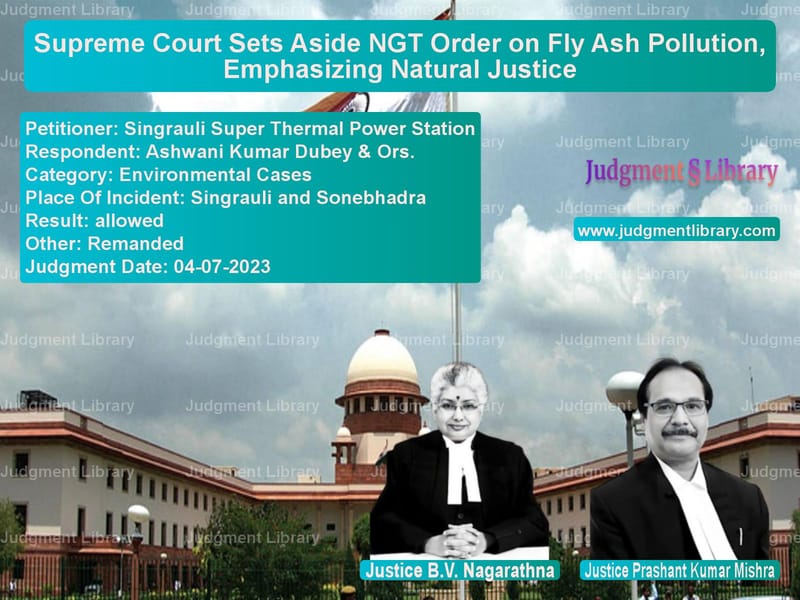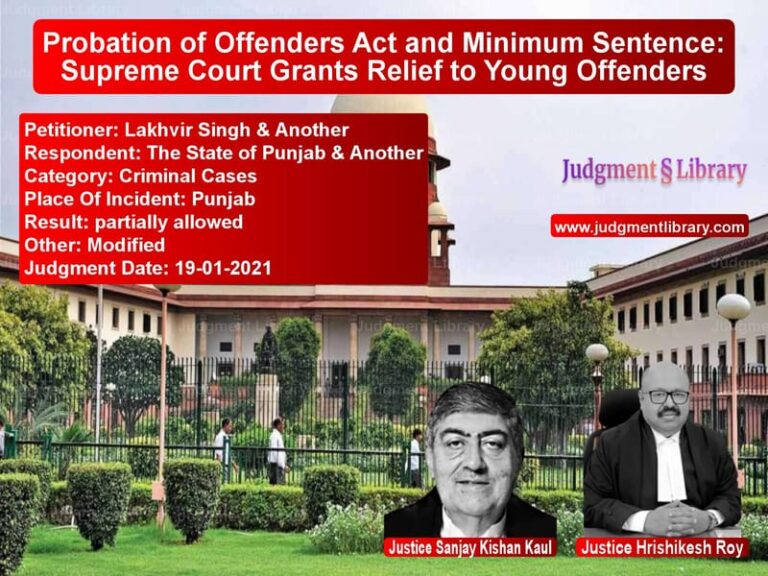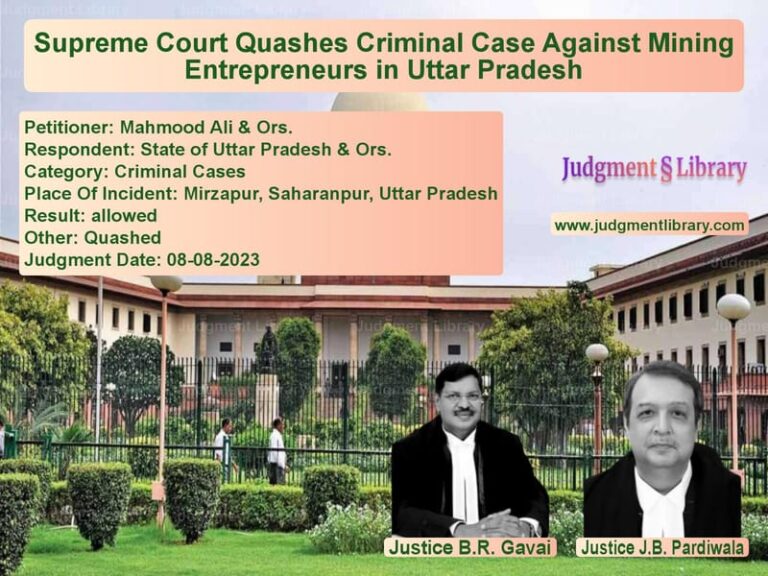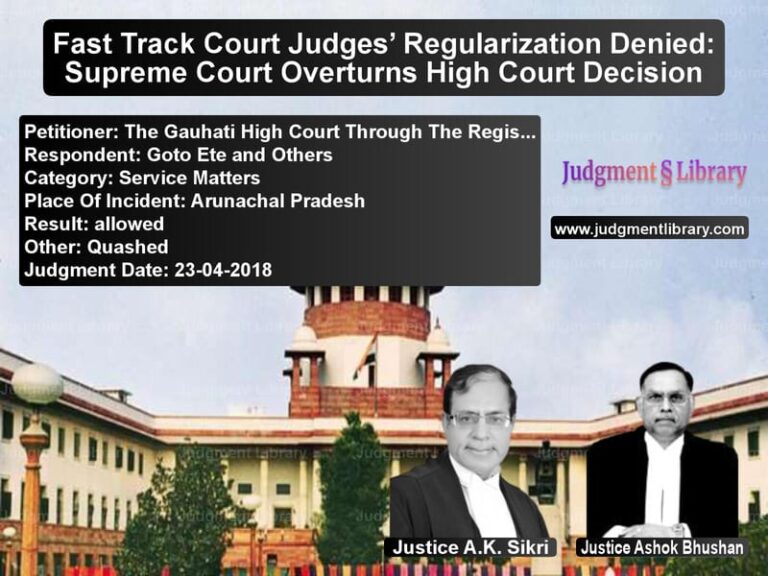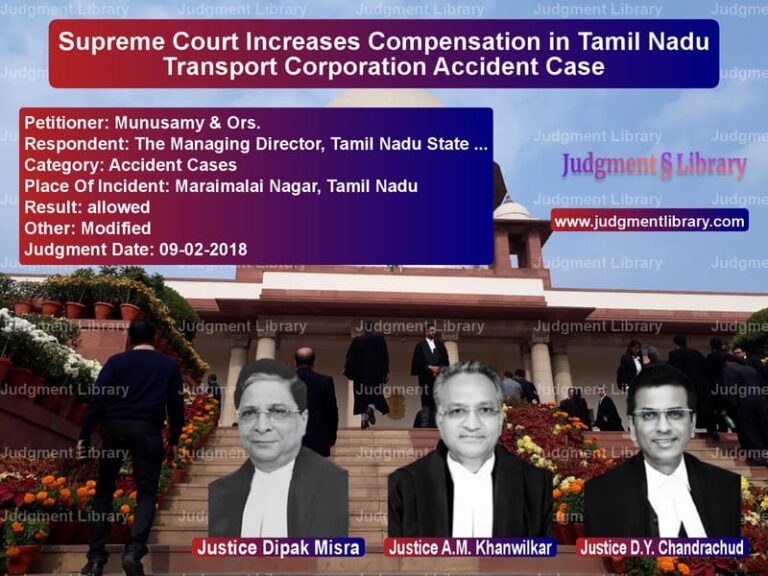Supreme Court Sets Aside NGT Order on Fly Ash Pollution, Emphasizing Natural Justice
The case of Singrauli Super Thermal Power Station v. Ashwani Kumar Dubey & Ors. concerns environmental issues related to the handling and disposal of fly ash generated by thermal power plants (TPPs) in the Singrauli and Sonebhadra regions. The Supreme Court ruled on July 5, 2023, setting aside an order of the National Green Tribunal (NGT) due to procedural irregularities and violation of natural justice principles.
Background of the Case
The appellants in the case were various thermal power plants and industries operating in Singrauli, Madhya Pradesh, and Sonebhadra, Uttar Pradesh. The NGT, in its order dated January 18, 2022, had issued several directions against these power plants regarding environmental violations, particularly in relation to the improper management and disposal of fly ash.
The NGT’s directions included:
- Constitution of a Fly Ash Management and Utilization Mission to oversee fly ash disposal.
- Imposition of penalties for past violations.
- Mandating pollution control measures such as the installation of air pollution control devices and fly ash dykes.
- Restoration of damaged areas and public health assessments.
The appellants, which included NTPC and other private power producers, challenged the NGT order before the Supreme Court, arguing that they were denied an opportunity to respond to the recommendations made by the expert committee appointed by the NGT.
Legal Issues Raised
- Did the NGT violate the principles of natural justice by not allowing the appellants to object to the expert committee’s recommendations?
- Was the NGT correct in issuing broad directions without giving individual consideration to each power plant’s compliance status?
- Should environmental adjudication involve direct participation from affected parties?
Arguments by the Appellants
The appellants, represented by the Solicitor General, contended:
- The NGT failed to give them an opportunity to object to the expert committee’s findings.
- The NGT’s decision was based solely on the committee’s report, without independent judicial analysis.
- The report was uploaded on the NGT website on January 15, 2022, and the final order was passed just three days later on January 18, 2022, making it impossible for them to respond.
- The NGT’s reliance on expert committees without hearing affected parties violated the principles of procedural fairness.
Arguments by the Respondents
The original petitioner before the NGT, Ashwani Kumar Dubey, did not appear before the Supreme Court, despite being served. The other respondents, including the Ministry of Environment, Forest and Climate Change (MoEF&CC), supported the appellants’ arguments and agreed that natural justice had been violated.
Supreme Court’s Observations
The Supreme Court found that the NGT had not provided the appellants with an opportunity to respond to the expert committee’s recommendations. The Court emphasized:
“The very nature of an adjudicatory function carries with it the requirement that principles of natural justice are complied with, particularly when there is an adversarial system of hearing before the Tribunal.”
The Court cited its previous rulings in Sanghar Zuber Ismail v. MoEF&CC and Kantha Vibhag Yuva Koli Samaj Parivartan v. State of Gujarat, reiterating that:
- Expert committee reports should not substitute independent judicial review.
- The affected parties must be given an opportunity to file objections and present their side.
- The tribunal should not delegate adjudicatory functions to administrative committees.
Final Judgment
The Supreme Court set aside the NGT order and remanded the matter back to the Tribunal for reconsideration. It directed:
- The appellants must be given an opportunity to file objections to the expert committee’s recommendations.
- The NGT must consider these objections before passing a final order.
- The Tribunal must independently analyze the matter instead of mechanically adopting the expert committee’s findings.
Implications of the Judgment
The Supreme Court’s ruling has broad implications for environmental law and adjudication:
- Reinforcement of Natural Justice: The judgment underscores the importance of procedural fairness in environmental litigation.
- Judicial Independence in Environmental Cases: It affirms that tribunals must independently assess expert reports rather than merely endorsing them.
- Impact on Future NGT Orders: The ruling sets a precedent for ensuring that industries and affected parties are given due process before adverse orders are passed.
Conclusion
The Supreme Court’s decision in Singrauli Super Thermal Power Station v. Ashwani Kumar Dubey & Ors. is a landmark ruling reinforcing the principles of natural justice in environmental litigation. While it does not negate the need for strict environmental compliance, it ensures that industries are given a fair hearing before being subjected to regulatory penalties and obligations. This case will serve as an important precedent for balancing environmental protection with due process rights in India.
Petitioner Name: Singrauli Super Thermal Power Station.Respondent Name: Ashwani Kumar Dubey & Ors..Judgment By: Justice B.V. Nagarathna, Justice Prashant Kumar Mishra.Place Of Incident: Singrauli and Sonebhadra.Judgment Date: 04-07-2023.
Don’t miss out on the full details! Download the complete judgment in PDF format below and gain valuable insights instantly!
Download Judgment: singrauli-super-ther-vs-ashwani-kumar-dubey-supreme-court-of-india-judgment-dated-04-07-2023.pdf
Directly Download Judgment: Directly download this Judgment
See all petitions in Environmental Cases
See all petitions in Judgment by B.V. Nagarathna
See all petitions in Judgment by Prashant Kumar Mishra
See all petitions in allowed
See all petitions in Remanded
See all petitions in supreme court of India judgments July 2023
See all petitions in 2023 judgments
See all posts in Environmental Cases Category
See all allowed petitions in Environmental Cases Category
See all Dismissed petitions in Environmental Cases Category
See all partially allowed petitions in Environmental Cases Category

